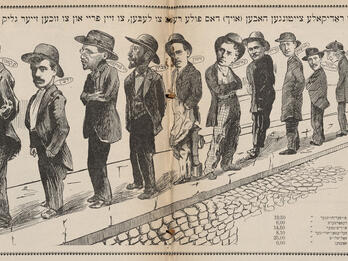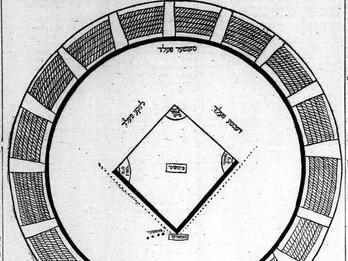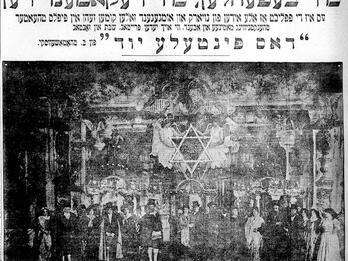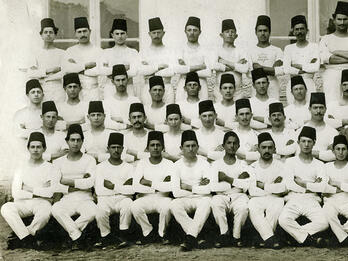Lamentation for Those Who Perished in the Abriyah Earthquake
The Kinah [Lament] in Honor of Those Who Died in the Earthquake
Wail O [professional female] mourners for the suffering of our death.
The earth trembled with the earthquakes. We lost young and old [alike].
How accursed was that night on which our appointed time [of death] came to us?
There was nothing we could do, the debris crashing down on our hearts.
How severe was this divine decree! We died alongside our children.
Dye us with indigo!1 None was able to save us.
We went to sleep in our beds happy, with utmost joy.
Our storehouses were all full of the goodness of the world, from far and wide.
Then we woke up, all of us naked, more naked than those down-and-out.
We hungrily went searching for bread. Come to our aid, O our brothers!
The earth shook us and we became frightened.
We rose from our beds and ran. We found death in front of us.
The roofs fell, we lost consciousness and our bones were broken.
The tsunami came upon us, it cast us into the depths.
Our children were screaming in front of us and we were not able to help them.
“Save us, O dear mother on this accursed night!”
They saw death in front of us. The earth was groaning from beneath the depths.
The stones fell upon our hearts and we were overcome with dread.
The sea continued to crash upon us and torrents of water from the sky.
The earthquake launched us in the air like a slingshot.
We were drowning in the sea and it pulled us into the open ocean.
The fish were swallowing us and the birds were sating themselves with our flesh.
How severe was this decree! O people, don’t hold back in your wailing!
Our houses slipped into the sea. One heard screaming from all sides.
This ill-fated earthquake: how many souls has it taken?
The nations heard this tale and came from their counties to save us.
They brought supplies, doctors, and all types of medicine with them.
They raised us up from beneath the rubble and wrapped us in sheets.
They put us in the midst of the steamship and treated us with medication.
They did their utmost in serving us. They saved us from death.
They put the dead that they found on a bier.
They covered them in shrouds. They carried them to the cemetery.
They took away the wounded and sent them to the steamship.
The doctors were treating them with injections in their flesh.
The king and the queen came to aid the afflicted.
[The queen was] like an affectionate mother. Her tears were streaming down her cheeks.
How much did that poor woman cry over the plight of us anguished people?
The king himself raised us up and saved us from beneath the rubble.
How many dead they found! Innumerable and beyond reckoning were they.
They brought phenol and poured it [on their lesions] and dressed their wounds.
They feared lest the survivors be harmed by the overwhelming stench of putridity.
With all their might they toiled to save our lives.
All of our children disappeared; we found not a trace of them.
They were covered by stones and earth. Their heads were crushed by rocks.
O what grief! What melancholy! Mourn, O hard-hearted people!
We found not even a sliver of light by which to save our lives.
Mount Etna released its fire over our houses, O brothers!
The tsunami waves appeared at that time and destroyed our houses.
The tremors appeared in an instant. They razed the buildings to their very foundations.
Such catastrophes are without precedent; they killed us and our children.
The queen strives to help the infirm and gives them their medicine.
She suffers and grieves of her own volition and her reward will be from the Lord of the heavens.
She even gives them soup. And she consoles them through this affair.
Every day she brings them food and commiserates in their suffering.
All of the nations sent telegrams lauding her for her deeds.
May God grant her long life and may she rejoice over her children
—on account of her compassion for the sick and her selflessness.
Such would be a small thing to ask of Him, even in this generation of ours.
The beautiful city of Messina was the finest of all the lands.
Its buildings were ruined and destroyed; a multitude of its residents died.
Our neighbors were beaten down by the earthquake. There is no compassion and no pity.
O God, have mercy upon our children. Save us from these catastrophes!
Translated by .
Joshua
Picard
Notes
[Wearing indigo-dyed clothing and smearing the skin with indigo were mourning rituals in some North African communities.—Trans.]
Credits
Eliezer Farḥi, Ḳinat al-nās alladī mātū fī kalabrīyah bi-al-zalzlāt wa-al-zaḥḳāt wa-fayaḍān al-baḥr wa-bi-al-ḥajar alladī ramá jabal al-nār [Lamentation for Those Who Perished in the Calabria Earthquake] (Tunis: Al-nasr, 1909), pp. 3–6.
Published in: The Posen Library of Jewish Culture and Civilization, vol. 7.






